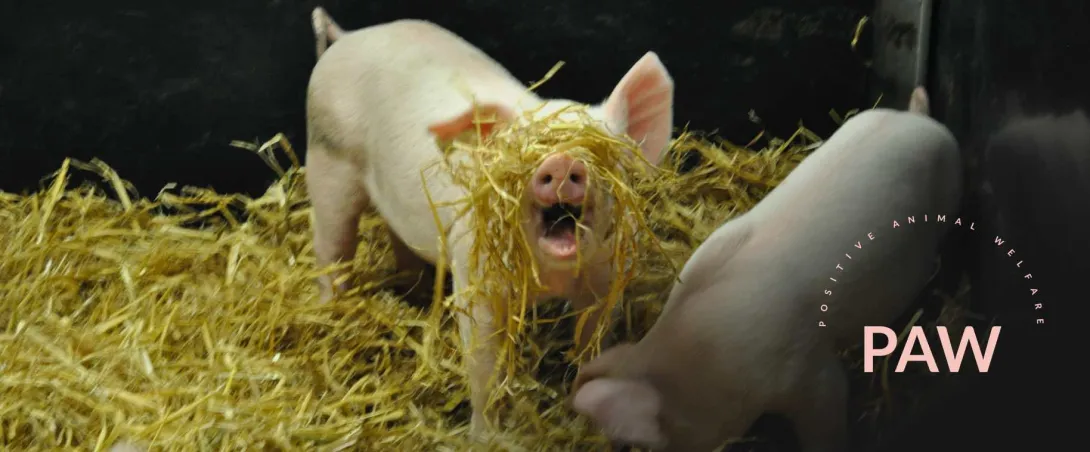Practical on-farm solutions for welfare and sustainability: Practical methods to promote and evaluate positive animal welfare (PAW)
Project Lead

Challenges
Scotland aims to provide farm animals with the highest possible standards of welfare. This aim falls within the context of a viable and adaptable agriculture sector, able to meet requirements for sustainability, climate change and biodiversity. These drivers are complex, requiring an evolving scientific evidence base to support decision-making, and flexible and innovative approaches to describe and support good welfare practices.
Agricultural practice is plagued by intractable and challenging welfare issues that are the focus of consumer attention:
- Separation of mothers and offspring
- Use of painful procedures,
- Chronic disease issues
- Confinement of animals in limited space with limited opportunities to express natural behaviour.
Increasingly, the ability of farming systems to meet consumers expectations for animal welfare are part of a ‘social licence to operate’ and essential if animal-based farming is to continue alongside other social requirements.
Positive animal welfare
Positive animal welfare (PAW) is a recent concept that emphasises animals having positive experiences. The scientific literature on PAW recognises that animals gain positive experiences by engaging in and completing rewarding behaviours (i.e., positive affective engagement (PAE)). PAE arises through the animal expressing its normal behaviour, and this can be assessed and monitored. However, farm environments can pose significant restrictions on the expression of normal behaviours.
Environmental enrichments are viewed as one response to the concern raised over behavioural restrictions. The concept of 'environmental enrichment' in scientific terms is clear; these enrichments should have functional importance to the animal and facilitate the performance of normal behaviours. However, it is unclear whether this scientific understanding of enrichment is widely shared.
However, the provision of enrichment in practice does not necessarily mean that animals benefit. Even if PAW is improved, not all enrichments are effective or used by enough animals. There is also evidence that negative factors can prevent animals from using and benefiting from enrichments. In summary, the use of appropriate environmental enrichments is key to attaining positive farm animal welfare. There are important knowledge gaps with respect to enrichment use across the different farmed species.
Questions
Solutions
This project aims to improve the effectiveness of enrichments for farmed species in Scotland. To achieve this our project will (1) develop a network (iPAW) of relevant stakeholders including relevant international contacts for improving PAW and (2) create a dedicated website (www.positiveanimalwelfare.net) as a hub of information on PAW research. We are providing practical welfare improvements to help maintain Scotland’s position as having some of the best animal welfare standards in the world.
Exploring stakeholder views on the purpose of environmental enrichment
The scientific conception of enrichment is clear that enrichments should have functional relevance to animals. Enrichments should facilitate the expression of rewarding normal behaviours. We do not know how widely the conception of enrichment is shared amongst stakeholders. A lack of a common understanding could constrain enrichments for different species. We are creating an inventory of currently applied enrichments for different species and cross-referencing this table with the scientific literature on the effectiveness of enrichments.
Assessing the use animals make of provided enrichments
Providing enrichments does not ensure that animals benefit from them, either because they are not appropriate for the species in question or because animals do not engage. This is a key issue for policy directed at improving PAW using enrichments. We are, therefore, assessing the use of enrichments in practice and new opportunities that could be used to assess them.
Evaluating the potential biological benefits of enrichment
The developing scientific literature suggests that environmental enrichment can provide hidden benefits. For example, enhancing an animal’s resilience to physical and psychological challenges. We are investigating whether enrichment improves resilience and identifying the costs and benefits of different enrichments.
Proposing actions to increase the effectiveness of enrichments
The insights generated by our project are informing a series of discussions focused on:
- Understanding the purpose of enrichments
- Improving existing enrichments
- Assessing how individual animals use enrichments in practice
- Incentivising stakeholders to use enrichments
Progress
2023 / 2024
Year two has involved work related to Objectives 1 (O1) - Understanding stakeholder views of the purpose of environmental enrichment; and Objective 2 (O2) - An inventory of currently applied enrichments for different species with cross-referencing to the scientific literature on the effectiveness of enrichments.
We have produced an infographic from the analysis of positive animal welfare (O1) which has been shared with the iPAW network and posted on the PAW website. The website now has a Resources page and banner advertising recently added content. Data from the iPAW network has been used to test the Analytic Hierarchy Process (AHP; a form of multi-criterion analysis) as a tool to assess the subjective human perceptions influencing enrichment selection and implementation in farmed pigs housing (O2). Whilst AHP showed some promise, there was a general lack of consistency of judgements across respondents which limited the effectiveness of the approach. We have also gathered information from the iPAW network on legal and farm assurance standards with respect to environmental enrichment. Interviews were carried out with government veterinary experts, scientists, members of farm assurance schemes and NGOs with experience of enrichment and international bodies involved in benchmarking commercial practices. A preliminary report has been prepared summarising the content of the interviews with the wider literature and this will be forwarded to stakeholders for input and further development.
An important question is whether enrichment standards (legal or farm assurance) are significantly enhancing animal welfare or moving farm animals towards a state of positive welfare. We are active members international consortiums with relevance to positive welfare, involved in working groups defining positive animal welfare, writing reviews on aspects of PAW and publishing on the science of positive emotions in humans and animals. We have published an updated chapter on PAW as applied to pigs. We have given several international talks on PAW including to the Nigeria Group for Animal Welfare. We have continued to develop the PAW website with additional text and resources including recordings of talks and references to published work.
New QBA milestones have contributed to the website development. At the start of Year 2 engagement with Waitrose supply chains was experiencing continued delay preventing collection of survey data, so alternative Qualitative Behavioural Assessment (QBA) milestones were proposed and agreed with RESAS. These included developing the QBA webpage as part of the PAW website, providing introductory text and video footage on QBA, a complete bibliography of studies using or discussing QBA, and a video presentation detailing the use of QBA as a measure for positive welfare. Draft survey questions for Year 3 were designed in preparation for potential re-engagement with supply chains in Year 3.
The use of QBA as a method for the assessment of emotional well-being, particularly as a measure of PAW, is growing. A research collaboration led by the Institute of Aquaculture at the University of Stirling produced a publication on the successful use of QBA detecting environmental impacts on salmon welfare. Prof Francoise Wemelsfelder continues to provide QBA training to animal scientists in the UK and further afield, thus contributing to recent PAW studies in, for example, dairy cows (Russell et al., 2023), pigs (Zarpata Cardona et al., 2023) and polar bears (Skovlund et al., 2023), with QBA featuring prominently in recent reviews of PAW indicators (Papageorgiou et al., 2023). A keynote talk on animal sentience, positive welfare and QBA was presented at the ISAE UK conference in April 2023.
Our PAW website, as a hub of information on different aspects of positive animal welfare, continues to attract interest. This year there have been over 4000 visits from 82 different countries.
2022 / 2023
Understanding stakeholder views of the purpose of EE and compiling an inventory of currently applied enrichments for different species
The iPAW network has been formed with members from non-governmental organisations (NGOs), retailers, industry bodies including farm assurance companies, and independent consultants; the network will be expanded as necessary for future work. The 15 current members have been interviewed using an interview schedule based around questions on a good life for farm animals and the role of EE in facilitating a good life. The interviews have been transcribed and a preliminary analysis has been completed. A further development of this analysis will be completed and passed back to the network for their commentary before compiling a final report. The positive animal welfare (PAW) website has been developed. Webpages covering the basic concepts of PAW have been produced along with initial project pages covering on-going relevant work.
Engage with Qualitative Behaviour Assessment (QBA)-based network of 12 supply chains to assess the understanding of PAW
The establishment of this network has experienced a delay, due to a person central to this objective departing. However, engagement of QBA app users of a particular stakeholder has take place as part of collaborations with external partners looking at the impact of digital technologies on farm management and animal welfare (led by Reading University - Schilling et al., 2023). In this paper, the interviewees explain how the participative nature of using the QBA app has led to a more in-depth reflection on animal welfare, facilitating a shift in perspective towards regarding animals as sentient beings and better understanding the importance of positive welfare. This promising outcome aligns with our inventory of participatory design tools focusing on performative/discursive approaches, which frame participants' actions, not as 'caused' by acquired views/knowledge, but as creative drivers of insight/improvement within what farmers see as 'Good Farmer' practice (Vigors et al., 2023). A knowledge exchange report with aims, methods and putative outcomes has been outlined to guide further engagement with this stakeholder.
Previous Projects
Related Projects
Improved husbandry & reduction of painful procedures
Our aim is to provide an evidence base for advice to farmers on the best approaches to improve the welfare of their animals. Guided by Scottish Government (RESAS) priorities, our work covers two specific areas, covering 4 species of commercial importance:
Welfare assessment techniques
To improve assessment of animal welfare in order to be able to characterise where animals are experiencing a net positive Quality of Life: Welfare of farmed livestock is an important ethical concern. Policy interest in the concept of 'positive welfare’ underlies our work. For this we aim to develop innovative welfare assessment techniques that improve our assessment of positive and negative welfare and overall Quality of Life.
